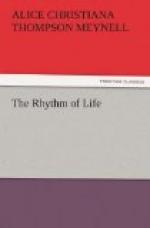BY THE RAILWAY SIDE
My train drew near to the Via Reggio platform on a day between two of the harvests of a hot September; the sea was burning blue, and there were a sombreness and a gravity in the very excesses of the sun as his fires brooded deeply over the serried, hardy, shabby, seaside ilex-woods. I had come out of Tuscany and was on my way to the Genovesato: the steep country with its profiles, bay by bay, of successive mountains grey with olive-trees, between the flashes of the Mediterranean and the sky; the country through the which there sounds the twanging Genoese language, a thin Italian mingled with a little Arabic, more Portuguese, and much French. I was regretful at leaving the elastic Tuscan speech, canorous in its vowels set in emphatic l’s and m’s and the vigorous soft spring of the double consonants. But as the train arrived its noises were drowned by a voice declaiming in the tongue I was not to hear again for months—good Italian. The voice was so loud that one looked for the audience: Whose ears was it seeking to reach by the violence done to every syllable, and whose feelings would it touch by its insincerity? The tones were insincere, but there was passion behind them; and most often passion acts its own true character poorly, and consciously enough to make good judges think it a mere counterfeit. Hamlet, being a little mad, feigned madness. It is when I am angry that I pretend to be angry, so as to present the truth in an obvious and intelligible form. Thus even before the words were distinguishable it was manifest that they were spoken by a man in serious trouble who had false ideas as to what is convincing in elocution.
When the voice became audibly articulate, it proved to be shouting blasphemies from the broad chest of a middle-aged man—an Italian of the type that grows stout and wears whiskers. The man was in bourgeois dress, and he stood with his hat off in front of the small station building, shaking his thick fist at the sky. No one was on the platform with him except the railway officials, who seemed in doubt as to their duties in the matter, and two women. Of one of these there was nothing to remark except her distress. She wept as she stood at the door of the waiting-room. Like the second woman, she wore the dress of the shopkeeping class throughout Europe, with the local black lace veil in place of a bonnet over her hair. It is of the second woman—O unfortunate creature!—that this record is made—a record without sequel, without consequence; but there is nothing to be done in her regard except so to remember her. And thus much I think I owe after having looked, from the midst of the negative happiness that is given to so many for a space of years, at some minutes of her despair. She was hanging on the man’s arm in her entreaties that he would stop the drama he was enacting. She had wept so hard that her




